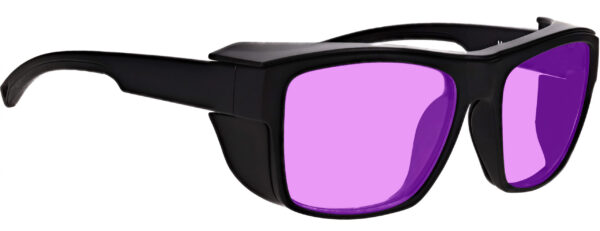DIDYMIUM GLASSES
Didymium glasses or Didymium Lenses are a type of safety eyewear originally designed to filter out the harmful sodium flare emitted off the glass when the glass is heated with a flame or torch. Didymium glass lenses are made from rare earth elements, such as praseodymium and neodymium. These elements give the glass the rose/purple color that everyone is used to seeing in the lampworking industry and it as well filters out the 585nm sodium flare-out of the torch allowing you to see the glass you are working on.
At Phillips Safety, while still offering the original glass version of didymium lenses we have also improved and developed specialized lenses for all different industries that need the sodium light removed but also need other protection well, such as UV and Infra Red protection as well. You can choose from a range of seven lens filters for lampworking, glass blowing, and blacksmithing, each with many frame options. Our top-notch lenses guarantee not only superior protection but also deliver effective results.
Phillips 202
VIEW PRODUCTS:
$ 152.25 - 341.25
Sodium Flare Poly
VIEW PRODUCTS:
$ 75 - 320
BoroTruView 3.0
VIEW PRODUCTS:
$ 140 - 350
WHAT ARE DIDYMIUM GLASSES FOR?
Today, didymium glasses are used in various industries where workers are exposed to bright yellow/orangish light. They are also sometimes used by astronomers and gemologists, who require high-contrast viewing of faint objects.
Didymium glasses are available in various styles, and depending on what your need to protect your eyes from, the lens colors can vary from purple, rose green, or even a blueish color lens. The lenses are typically made from either polycarbonate plastic or glass that is impact-resistant and scratches resistant. Plus, the frames are typically made from a durable, lightweight material, such as nylon or polycarbonate.
A common doubt regarding this filter is what color shows the most dramatic change through didymium glasses. When looking through didymium glasses, the colors in the red and purple range typically show the most dramatic change. This is because didymium glasses block out the yellow and orange light that can make these colors appear less intense. Colors in the green and blue range may also appear more vibrant when viewed through didymium glasses, but the effect is generally less dramatic than with red and purple colors.
It’s worth noting that the exact effect of didymium glasses on color perception can vary depending on factors such as the specific composition of the glass being worked with, the lighting conditions in the workspace, and individual differences in color perception.
WHAT DO DIDYMIUM GLASSES DO IN GLASSWORKING?
Didymium glasses were originally developed for glass frameworks and other workers in the glass industry who need protection from the bright light produced by their work. The didymium glasses for lampworking are designed to filter out the orange-yellow light emitted by the hot glass, which can cause eye strain and fatigue and block UV and IR radiation.
While didymium glasses used to be worn for welding applications, especially the Green didymium shades 3 and 5, they are not anymore today. An alternative for that can be using a drop-in didymium lens in the back of your welding helmet.
SHOP PHILLIPS 202 GLASSES
-

Phillips 202 Lampworking Glasses X25
Rated 0 out of 5$220.50 Select options -



Phillips 202 Lampworking Glasses T9730
Rated 0 out of 5$220.50 Select options -


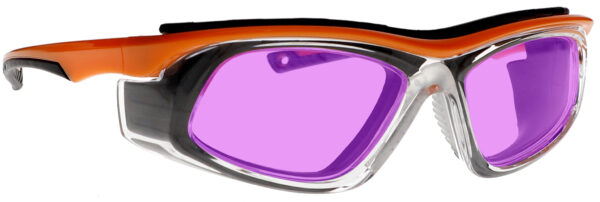
Phillips 202 Lampworking Glasses T9603
Rated 0 out of 5$220.50 Select options -



Phillips 202 Lampworking Glasses T9559
Rated 0 out of 5$220.50 Select options -



Phillips 202 Lampworking Glasses T9538S
Rated 0 out of 5$220.50 Select options -



Phillips 202 Lampworking Glasses RK2
Rated 0 out of 5$241.50 Add to cart
WHAT IS THE DIFFERENCE BETWEEN
DIDYMIUM GLASSES AND WELDING GLASSES?
Didymium glasses and welding glasses are designed with two different purposes in mind. Lampworking or glass blowing glasses didymium is needed to filter out the yellow sodium flare allowing the worker to see clearly what they are working on. Welding glasses or welding lenses, on the other hand, are made from glass or polycarbonate lenses containing special dyes and minerals that block ultraviolet and infrared radiation emitted by welding arcs. They also tend to be much darker and block out almost all the light to the point where you can bearly see through them. This is to protect the welder from welder flash caused by intense bright light from the welding.
While some of the newer didymium glasses provide excellent protection against UV and IR radiation, they are unsuitable for use when the eyes need to be protected from visible light of other wavelengths. For example, they are not recommended for laser, radiation, or welding applications requiring specialized eye protection.
WHAT ARE DIDYMIUM GLASSES USED FOR IN LAMPWORK?
WHAT ARE DIDYMIUM GLASSES USED FOR IN LAMPWORK?
Didymium glasses for Lampworking glasses are made from a type of glass with a unique spectral transmission curve that filters out specific wavelengths of light, particularly yellow and orange light. This makes it easier for lampworkers to see the color of the glass they are working with and to identify colors and glass temperatures.
Commonly purchased didymium glasses, have gone through an update over the years in both their filter and lens materials, becoming similar but different filters: Phillips202 Glass Lenses or Sodium Flare Polycarbonate. Both these filters provide excellent sodium flare filtration for lampworking and are ideal for soft glass and small glass work. The Glass Phillips202 Lenses tend to be lighter in color and not as dark as the sodium flare polycarbonate ones. While the Polycarbonate lenses will be lighter in weight then the Phllips202 lenses.
If you are working with Borosilicate glass or larger pieces of soft glass you will want to go with a Sodium Flare filter that offers you more UV and IR protection like the BoroTruView 3.0 or BoroTruview 5.0 lenses. While offering the same Sodium flare protection as the Didymium or Phillips202 filters, the BoroTrueView line of lenses will knock down the visible light and block all the UV and IR light in comparison to Green IR 3.0 or IR 5.0 welding filter.
Didymium glasses for Lampworking glasses are made from a type of glass with a unique spectral transmission curve that filters out specific wavelengths of light, particularly yellow and orange light. This makes it easier for lampworkers to see the color of the glass they are working with and to identify colors and glass temperatures.
Commonly purchased didymium glasses, have gone through an update over the years in both their filter and lens materials, becoming similar but different filters: Phillips202 Glass Lenses or Sodium Flare Polycarbonate. Both these filters provide excellent sodium flare filtration for lampworking and are ideal for soft glass and small glass work. The Glass Phillips202 Lenses tend to be lighter in color and not as dark as the sodium flare polycarbonate ones. While the Polycarbonate lenses will be lighter in weight then the Phllips202 lenses.
If you are working with Borosilicate glass or larger pieces of soft glass you will want to go with a Sodium Flare filter that offers you more UV and IR protection like the BoroTruView 3.0 or BoroTruview 5.0 lenses. While offering the same Sodium flare protection as the Didymium or Phillips202 filters, the BoroTrueView line of lenses will knock down the visible light and block all the UV and IR light in comparison to Green IR 3.0 or IR 5.0 welding filter.
WHAT ARE DIDYMIUM GLASSES
USED FOR IN LAMPWORK?
Didymium glasses for Lampworking glasses are made from a type of glass with a unique spectral transmission curve that filters out specific wavelengths of light, particularly yellow and orange light. This makes it easier for lampworkers to see the color of the glass they are working with and to identify colors and glass temperatures.
Commonly purchased didymium glasses, have gone through an update over the years in both their filter and lens materials, becoming similar but different filters: Phillips202 Glass Lenses or Sodium Flare Polycarbonate. Both these filters provide excellent sodium flare filtration for lampworking and are ideal for soft glass and small glass work. The Glass Phillips202 Lenses tend to be lighter in color and not as dark as the sodium flare polycarbonate ones. While the Polycarbonate lenses will be lighter in weight then the Phllips202 lenses.
If you are working with Borosilicate glass or larger pieces of soft glass you will want to go with a Sodium Flare filter that offers you more UV and IR protection like the BoroTruView 3.0 or BoroTruview 5.0 lenses. While offering the same Sodium flare protection as the Didymium or Phillips202 filters, the BoroTrueView line of lenses will knock down the visible light and block all the UV and IR light in comparison to Green IR 3.0 or IR 5.0 welding filter.
Didymium glasses for Lampworking glasses are made from a type of glass with a unique spectral transmission curve that filters out specific wavelengths of light, particularly yellow and orange light. This makes it easier for lampworkers to see the color of the glass they are working with and to identify colors and glass temperatures.
Commonly purchased didymium glasses, have gone through an update over the years in both their filter and lens materials, becoming similar but different filters: Phillips202 Glass Lenses or Sodium Flare Polycarbonate. Both these filters provide excellent sodium flare filtration for lampworking and are ideal for soft glass and small glass work. The Glass Phillips202 Lenses tend to be lighter in color and not as dark as the sodium flare polycarbonate ones. While the Polycarbonate lenses will be lighter in weight then the Phllips202 lenses.
If you are working with Borosilicate glass or larger pieces of soft glass you will want to go with a Sodium Flare filter that offers you more UV and IR protection like the BoroTruView 3.0 or BoroTruview 5.0 lenses. While offering the same Sodium flare protection as the Didymium or Phillips202 filters, the BoroTrueView line of lenses will knock down the visible light and block all the UV and IR light in comparison to Green IR 3.0 or IR 5.0 welding filter.
SHOP SODIUM FLARE POLY GLASSES
-



Sodium Flare Poly Lampworking Glasses F126
Rated 0 out of 5$120.00 Select options -



Sodium Flare Poly Lampworking Glasses EX36FS
Rated 0 out of 5$120.00 Select options -



Sodium Flare Poly Lampworking Glasses EGM
Rated 0 out of 5$190.00 Select options -


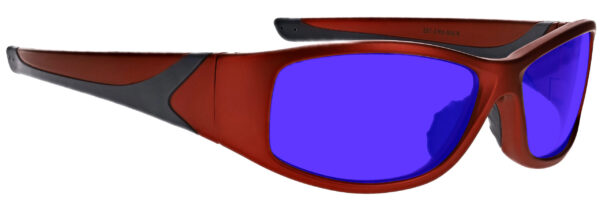
Sodium Flare Poly Lampworking Glasses 808
Rated 0 out of 5$120.00 Select options -


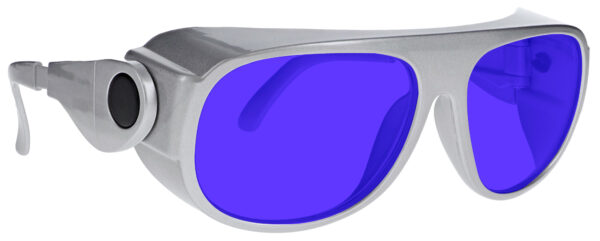
Sodium Flare Poly Lampworking Glasses 66
Rated 0 out of 5$97.50 Select options -


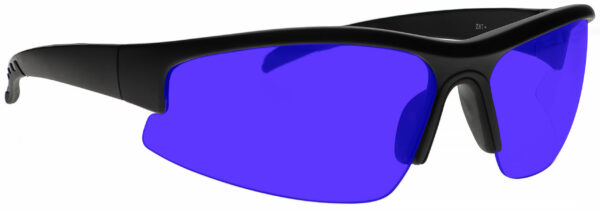
Sodium Flare Poly Lampworking Glasses 282
Rated 0 out of 5$100.00 Add to cart
WHERE TO GET GLASSWORKING SAFETY GLASSES
Lampworking and glass blowing safety glasses are essential for eye protection of glass workers, but they provide more than that. Since they remove the glare of the flame and filter radiation, it is possible to see the color of the glass that is being transformed, despite the fire. This is important because it is the only way to safely visualize the glass’s true colors while it is undergoing transformation.
Phillips Safety offers seven different lens filters for lampworking and glass blowing, all with dozens of frame options. Our lenses are high-quality products with effective results and superior protection. For more information about the Phillips 202 and Sodium Flare Poly filters, check out Phillips Safety’s Lampworking Catalog. There you can read more about each of them with their specificities and compare them to Phillips Safety’s five other glassworking filters.
Don’t hesitate to check out our collection of glassworking glasses. We are confident that you will find the perfect glasses for your needs. If you need help or more information about our products, our representatives are just one click away: talk to us through our chat, e-mail us at service@phillips-safety.com, or call us at 1-866-575-1307.
SHOP BOROTRUVIEW GLASSES
-



BoroTruView 5.0 Lampworking Glasses 600
Rated 0 out of 5$190.00 Select options -



BoroTruView 5.0 Lampworking Glasses 33
Rated 0 out of 5$192.00 Select options -



BoroTruView 5.0 Lampworking Glasses 300
Rated 0 out of 5$190.00 Add to cart -


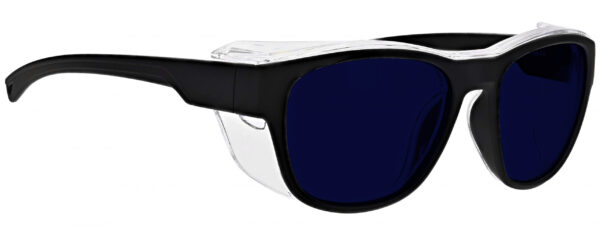
BoroTruView 3.0 Lampworking Glasses X26
Rated 0 out of 5$210.50 Select options -


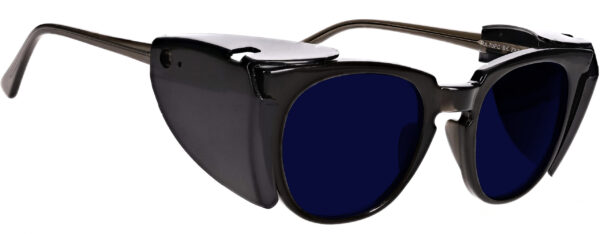
BoroTruView 3.0 Lampworking Glasses 70PC
Rated 0 out of 5$180.00 Select options -


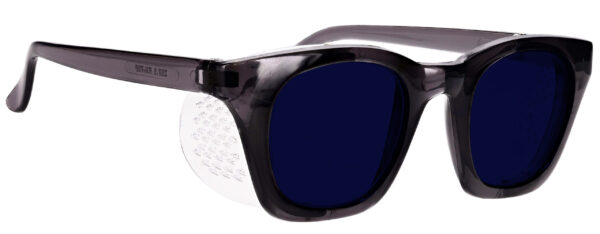
BoroTruView 3.0 Lampworking Glasses 70F
Rated 0 out of 5$175.00 Select options
HOW TO CLEAN YOUR GLASSWORKING GLASSES
Cleaning your glassworking glasses is crucial to extend the lifetime of your glassworking safety eyewear. Properly cleaning your glassworking glasses is essential to maintain the lifetime of your lampworking glasses. No matter if you use your glassworking glasses for work or hobby, they may get dirty in a variety of ways, so it is important to know how to clean them.
Phillips Safety’s glassworking safety glasses are amazing because of their special lenses; cleaning them the wrong way can permanently damage your glasses. The first step to prolonging the life of your glass blowing glasses is monitoring them for dirtiness and damage. If your lenses are dirty, it can impact your vision. It is important to check your glassworking glasses lenses every day to ensure they have not become too dirty.
HOW TO CLEAN YOUR GLASSWORKING GLASSES
ALWAYS CARRY A
MICROFIBER CLOTH
The microfiber cloth will be gentle on your glasses and will prevent them from getting scratched.
HAVE A CLEANING SOLUTION
The cleaning solution is to clean and disinfect your glassworking glasses with, wiping away dirt and debris.
USE PURIFIED ROOM TEMPERATURE WATER
Submerge your lampworkinf glasses under running temperature room water and add non abrasive dish soap. Let it dry.
